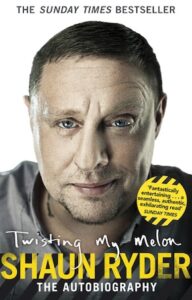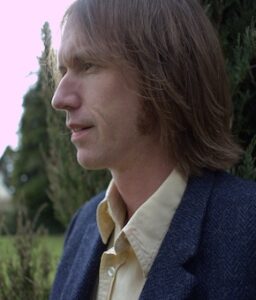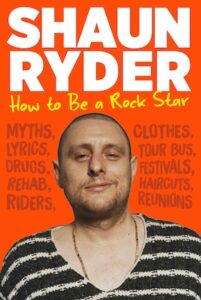Stepping on
by Brett MarieIs there a genre of music more in love with itself than rock ’n’ roll? I ask not as a detractor but as a devotee. No form of art or entertainment has given me more joy, and none has fascinated me more than rock music. I’ve waxed poetic about it in a novel, in reviews, and in hundreds of spirited discussions with fellow obsessives since my religious conversion at thirteen years old. And yet if you tallied up everything I’ve written or said in admiration of the form, you probably wouldn’t come close to the word count rock itself has built up in song throughout the decades since Bill Haley & His Comets first chanted ‘Don’t Knock the Rock’. Consider just a few titles from over the years: ‘Rock and Roll Is Here to Stay’, ‘Anything That’s Rock ’n’ Roll’, ‘Long Live Rock’, ‘Old Time Rock and Roll’, ‘I Love Rock ’n’ Roll’, ‘Rock and Roll Ain’t Noise Pollution’. Clearly, this music is unique in its need to pause at regular intervals to sing its own praises.
Happy Mondays and Black Grape vocalist and songwriter Shaun Ryder carries this tradition into the print realm with his new book How to Be a Rock Star, taking 300 pages to celebrate the music and lifestyle that transformed him from a go-nowhere son of Salford to a beloved icon of excess. This volume follows the singer’s 2011 memoir Twisting My Melon, but although there’s plenty of overlap between the two works, this is not a mere re-tread. Yes, the Ryder of 2021 is happy to revisit scenes he’s covered before, but here he stacks his own stories against those of other legendary performers. From The Beatles and the Stones to New Order, Oasis and The Stone Roses, the names keep coming as Ryder draws from his encyclopaedic knowledge of musical mythology to catalogue the minutiae of rock stardom.
 “As far back as I can remember,” he tells us in his introduction, “I always wanted to be a rock star. It’s the first thing I ever really wanted to be. Probably the only thing I’ve ever wanted to be.” But the ‘How to’ part of the book’s title is key: though he opens with a passionate reminiscence of the rock flicks That’ll Be the Day and Stardust, and the mystique-filled world that they revealed to him as a twelve-year-old boy, beyond the book’s intro his tone is workaday. Stardom, he tells us, is “bloody hard work. It’s a slog to get started, and to get noticed.” And he has no qualms about demystifying the rock ‘n’ roll life. He’s happy to debunk all the myths of his exploits as a drugged-out superstar, while simultaneously admitting the crass reason he and his peers have let them promulgate: the myths sell more records. He’s disarmingly candid about the reasons many stars – himself included – agree to reunion tours with bandmates they actively dislike: “Let’s face it, most reunions are initially about the cash rather than putting any unfinished business to bed. When we first put the Mondays back together, in 2000, it was pretty much purely a financial decision at first.”
“As far back as I can remember,” he tells us in his introduction, “I always wanted to be a rock star. It’s the first thing I ever really wanted to be. Probably the only thing I’ve ever wanted to be.” But the ‘How to’ part of the book’s title is key: though he opens with a passionate reminiscence of the rock flicks That’ll Be the Day and Stardust, and the mystique-filled world that they revealed to him as a twelve-year-old boy, beyond the book’s intro his tone is workaday. Stardom, he tells us, is “bloody hard work. It’s a slog to get started, and to get noticed.” And he has no qualms about demystifying the rock ‘n’ roll life. He’s happy to debunk all the myths of his exploits as a drugged-out superstar, while simultaneously admitting the crass reason he and his peers have let them promulgate: the myths sell more records. He’s disarmingly candid about the reasons many stars – himself included – agree to reunion tours with bandmates they actively dislike: “Let’s face it, most reunions are initially about the cash rather than putting any unfinished business to bed. When we first put the Mondays back together, in 2000, it was pretty much purely a financial decision at first.”
After living and breathing rock ’n’ roll over four or five decades, Ryder can claim some authority on his subject. He’s well-versed in many of the pitfalls of the lifestyle, having jumped into many of them with both feet. It’s therefore a bit perplexing when Ryder claims that “most rock stars are making it up as they go along.” If that’s true, then they’re not the most inventive bunch. For every aspect of the business the author covers, be it the rise to stardom, the reckless behaviour while riding high on the charts, or the band-busting ego battles, he can point to half a dozen stories, from half a dozen bands, that follow the same arc. A chapter about the singer’s Olympian drug intake takes a route through the standard string of abortive rehab stints before arriving at the final clean break, followed by the obligatory assertion of contented sobriety. “I’m not running away from anything and I’m happier than I’ve ever been,” he tells us – a line that feels like he might have found it embossed on a paperweight in the Charter Clinic gift shop.
As he explores each topic in turn, Ryder freewheels along, following tangents, doubling back on himself, occasionally gathering his thoughts up in a final summation, just as often simply petering out.”
The one time Ryder steps off the well-worn path of R&R cliché, it’s in defence of his late-career dive into reality TV. Nowadays the singer is as likely to be recognised in the street as an alum from I’m a Celebrity… Get Me Out of Here, or his stint on Celebrity Gogglebox with Mondays/Black Grape bandmate Bez, as he is for his contributions to popular music (“you go and do a bit of reality TV and more people recognize you than Morrissey”). And he’s well aware of the music purists out there who see him as a sell-out for stooping to such an artistic low. But if his casual dismissal of these snobs doesn’t quite radiate artistic integrity, it is at least refreshing in its honesty, a sign that as he’s grown from troubled young frontman to older, wiser family man, he’s gained enough perspective to avoid taking it all too seriously.
 Coming from a songwriter described by Factory Records co-founder Tom Wilson as “the greatest poet since Yeats,” one whose selected lyrics made it into print courtesy of Faber in 2019, this book’s conversational prose is surprisingly artless. In a way, this is entirely appropriate; Ryder discusses in some detail his struggles with ADHD and dyslexia, and it’s only right that he and co-writer Luke Bainbridge (who also co-wrote Twisting My Melon) should roll with rather than rein in his innate attention deficit. Still, this goes beyond ‘rolling with’ anything. I picture Bainbridge arriving for a pint with Ryder, setting down a tape recorder between them, and saying, “Right. ‘Video shoots’. Go!” The two writers had the forethought to brainstorm over 30 subjects to cover, but as he explores each topic in turn, Ryder freewheels along, following tangents, doubling back on himself, occasionally gathering his thoughts up in a final summation, just as often simply petering out.
Coming from a songwriter described by Factory Records co-founder Tom Wilson as “the greatest poet since Yeats,” one whose selected lyrics made it into print courtesy of Faber in 2019, this book’s conversational prose is surprisingly artless. In a way, this is entirely appropriate; Ryder discusses in some detail his struggles with ADHD and dyslexia, and it’s only right that he and co-writer Luke Bainbridge (who also co-wrote Twisting My Melon) should roll with rather than rein in his innate attention deficit. Still, this goes beyond ‘rolling with’ anything. I picture Bainbridge arriving for a pint with Ryder, setting down a tape recorder between them, and saying, “Right. ‘Video shoots’. Go!” The two writers had the forethought to brainstorm over 30 subjects to cover, but as he explores each topic in turn, Ryder freewheels along, following tangents, doubling back on himself, occasionally gathering his thoughts up in a final summation, just as often simply petering out.
Happily, the singer’s winning personality carries the day; as long as we don’t expect him to slip us a Grand Unifying Theory, we can enjoy his ideas and anecdotes as the contented ramblings of a man slipping happily into middle age. If there is a lesson to be learned here, perhaps it’s simply that rock stars are just like you and me – they just have better stories.
How to Be a Rock Star by Shaun Ryder is published in hardback and eBook by Allen & Unwin.
Read more
VisitsFromFutureTechnology
@officialswr
@AllenandUnwinUK
 Brett Marie, also known as Mat Treiber, grew up in Montreal with an American father and a British mother and currently lives in Herefordshire. His short stories and other writing have appeared in publications including The New Plains Review, The Impressment Gang, PopMatters and Bookanista, where he is a contributing editor. His debut novel The Upsetter Blog is out now from Owl Canyon Press.
Brett Marie, also known as Mat Treiber, grew up in Montreal with an American father and a British mother and currently lives in Herefordshire. His short stories and other writing have appeared in publications including The New Plains Review, The Impressment Gang, PopMatters and Bookanista, where he is a contributing editor. His debut novel The Upsetter Blog is out now from Owl Canyon Press.
Read more
@owlcanyonpress
Facebook: Brett Marie
@brettmarie1979
bookanista.com/author/brett-marie/
Author portrait © Roxanne Fontana


